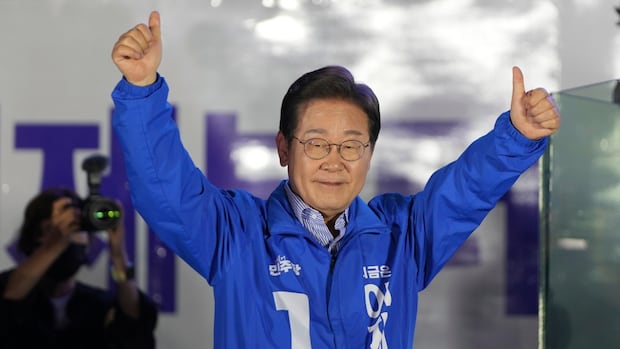South Korea’s liberal party candidate Lee Jae-myung is projected to win the country’s snap presidential election, according to projections by the country’s broadcasters on Tuesday.
Reuters has not independently confirmed the results of the joint exit poll by broadcasters KBS, MBC and SBS, which put Lee of the Democratic Party at 51.7 per cent and his rival Kim Moon-soo of the People Power Party at 39.3 per cent.
The exit poll has in previous elections mostly been in line with the final results. A separate poll by broadcaster JTBC put Lee at 50.6 per cent and Kim at 39.4 per cent. Channel A also predicted a Lee win by similar margins.
Voting began at 6 a.m. local time at 14,295 polling stations nationwide and closed at 8 p.m.
The winner must tackle challenges including a society deeply scarred by divisions made more obvious since the attempt at military rule, and an export-heavy economy reeling from unpredictable protectionist moves by the United States, a major trading partner and security ally.
Around 78 per cent of South Korea’s 44.39 million eligible voters had cast ballots, according to the National Election Commission, with car dealerships, gyms and fields for traditional Korean wrestling (known as ssireum) turned into polling stations to pick the leader of Asia’s fourth-largest economy.
The democratic event was taking place six months after turmoil triggered by shock martial law briefly imposed by former leader Yoon Suk Yeol.

Voters hope for stability
After being impeached by parliament in December, Yoon was removed from office by the Constitutional Court on April 4, less than three years into his five-year term, triggering the snap election that now stands to remake South Korea’s political leadership and foreign policies.
“I hope the issues surrounding martial law are addressed more clearly and transparently,” said 40-year-old Seoul resident Kim Yong-Hyun. “There are still many things that don’t make sense, and I’d like to see them properly resolved.”

Lee had called the election “judgment day” against the previous Yoon administration and the conservative People Power Party, accusing them of having condoned the martial law attempt by not fighting harder to thwart it and even trying to save Yoon’s presidency.
Kim was Yoon’s labour minister when the former president declared martial law on Dec. 3.
“Only six golden hours are left to save South Korea, which is in crisis due to the greed of the establishment,” Lee said as he urged people to vote in a Facebook post.
Both Lee and Kim pledged change for the country, saying a political system and economic model set up during its rise as a budding democracy and industrial power are no longer fit for purpose.
Their proposals for investment in innovation and technology often overlap, but Lee advocates more equity and help for mid-to low-income families, while Kim has campaigned on giving businesses more freedom from regulations and labour strife.
Overshadowing any social policy initiatives, however, was Yoon’s brief attempt to impose martial law, which has loomed large over the poll.

Kim has branded Lee a “dictator” and his Democratic Party a “monster,” warning if the former human rights lawyer becomes president, nothing will stop them from working together to amend laws simply because they do not like them.
“I and the People Power Party will do our best to save people’s livelihoods and the economy,” Kim said in a Facebook post.
Both Lee and Kim cast their ballots during early voting last week.
Regular voters in Seoul urged the next leader to ease discord, restore stability and address urgent challenges from the fallout of the crisis that has touched their families.
“The economy has gotten so much worse since December 3, not just for me but I hear that from everybody,” Kim Kwang-ma, 81, said. “And we as a people have become so polarized … I wish we could come together so that Korea can develop again.”
The National Election Commission is scheduled to certify the result on Wednesday and the winner’s inauguration is expected within hours.
In the past 24 hours, South Korean President Yoon Suk Yeol declared martial law, only for his decision to be unanimously rejected by a parliamentary vote. Andrew Chang explains the turmoil that led to the president’s declaration, and what it says about the state of South Korean politics.
Images supplied by Reuters and Getty Images.

